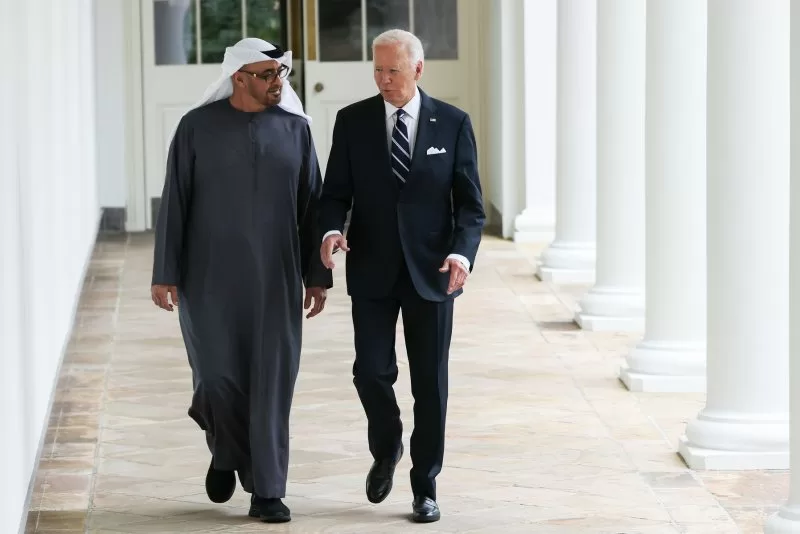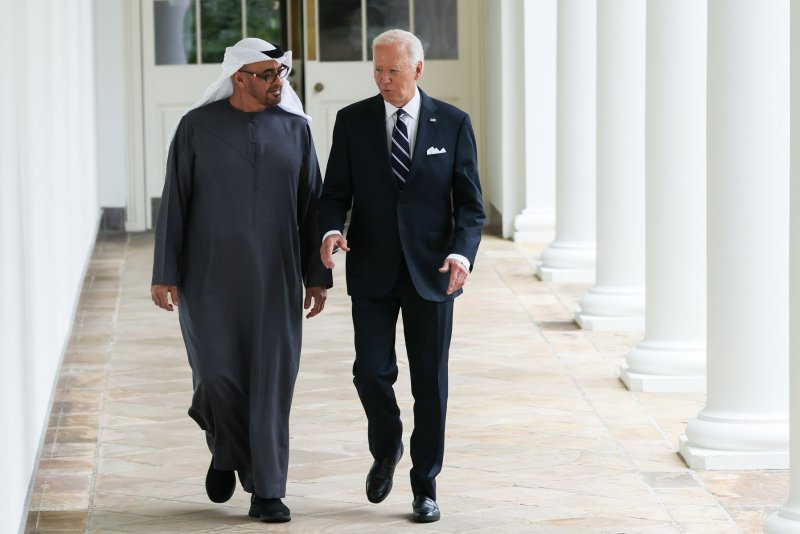1 of 6 | United Arab Emirates (UAE) President Sheikh Mohammed bin Zayed Al Nahyan walks along the colonnade with President Joe Biden at the White House on Monday, in Washington, D.C. President Biden is hosting the UAE president for a bilateral meeting to discuss escalating tensions in the Middle East, trade and technology. Photo by Samuel Corum/UPI |
License PhotoSept. 23 (UPI) — United Arab Emirates President Sheikh Mohammed bin Zayed Al Nahyan met with President Joe Biden on Monday at the White House for the first visit by an Emirati leader to the United States since the UAE was founded in 1971.
The two leaders discussed trade and the economy, technology and artificial intelligence, space, energy and climate action, according to Emirates News Agency. Sheikh Mohammed and Biden also discussed escalating tensions in the Middle East amid Israel’s ongoing war against Hamas in Gaza, as well as their “strategic partnership.”
“Today, we honor that legacy to carry our relationship forward as UAE is a nation of trailblazers and always looking to the future, always making big bets and that’s something our countries have in common and our people have in common,” Biden told reporters before the meeting.
The UAE president pledged “unwavering commitment to work with the United States for the sake of deepening the strategic partnership between our two nations,” according to an interpreter in the Oval Office.
Among those items discussed during their meeting, the two leaders reached an agreement on artificial intelligence and related technologies, according to a statement from the White House.
“We recognize the tremendous potential for AI for good, including to accelerate economic growth, transform education and healthcare, create jobs and drive environmental sustainability,” the statement reads. “At the same time, we acknowledge the challenges and risks of this emerging technology and the vital importance of safeguards and protections with respect to the most advanced technologies.”
Sheikh Mohammed and Biden agreed Monday to collaborate on and promote “ethical AI research and development,” to cooperate on “AI protection and cybersecurity” — as well as “talent development and exchange” — and to “promote clean energy for the AI future,” while supporting “AI for sustainable development in developing countries.”
Sheikh Mohammed also was scheduled to meet with Vice President Kamala Harris later Monday to discuss the war in Gaza, as the UAE has voiced frustration with the lack of progress on a cease-fire agreement between Israel and Hamas nearly a year into the war.
Last week, the Emirates announced it would not support any postwar reconstruction in Gaza without a path for Palestine.
“The United Arab Emirates is not ready to support the day after the war in Gaza without the establishment of a Palestinian state,” “Sheikh Abdullah bin Zayed Al Nahyan, the UAE foreign minister, wrote on social media.
During their meeting, Biden was expected to discuss the crisis in Sudan and the need to “increase efforts to open routes for humanitarian assistance and ultimately to secure a cease-fire,” according to White House press secretary Karine Jean-Pierre.
Last week, Biden urged the paramilitary group, the Rapid Support Forces, to “stop their assault that is disproportionately harming Sudanese civilians.” The Emirates has provided weapons to fighters in Sudan, where famine was officially declared last month after 18 months of fighting and tens of thousands of deaths.
Sheikh Mohammed’s U.S. visit is primarily focused on moving the U.S.-Emirates relationship beyond trading oil in the gulf region to “realigning our relationship with America for the next 10 years,” Abu Dhabi, Anwar Gargash, a diplomatic adviser to the president, told The National.
“Sometimes people like to talk about some tensions in the relationship, but the big story is that this is our most important strategic relationship, regardless of fair or foul weather,” Gargash added.

